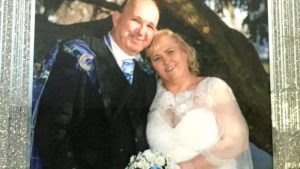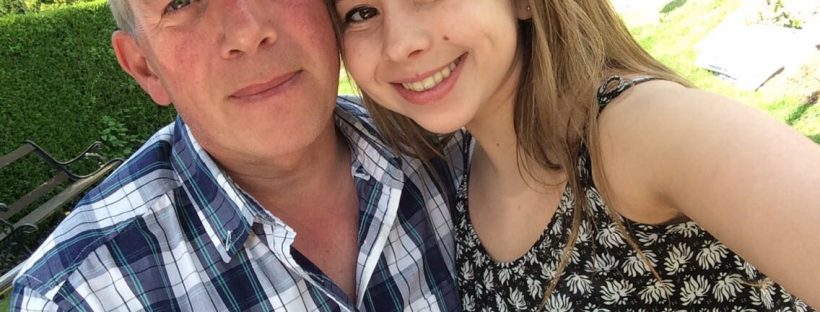Being the recipient of any transplanted organ should come with a new life, a fresh start to begin to live to the full again after having life-restricting dialysis due to the disease or failure of organs.
This is what Pauline Hunt, 49, from Kilmarnock in Ayrshire thought would happen after receiving a kidney transplant from a deceased donor in December 2017. Little did she know that the organ that was meant to give her a fresh start in life, away from illness and hospital visits, would turn into a “death sentence.”
Pauline said; “I woke up the next morning and I felt great. We just had this new life.”

“I was fine for a few weeks and then I got this growth just above the kidney bed. They said it was fluid. But by the end of January I wasn’t feeling well again.” It was clear to Pauline that something wasn’t quite right and her “new life” with a functioning organ was beginning to not look as good and healthy as she thought it would.
“I don’t know how long I have got. I have caught cancer from a donor who should have been so healthy that this shouldn’t have happened.”
Looking at the statistics, according to the BBC, a total of 4,039 people had a transplant from a deceased donor in the UK last year and the risk of the transmission of cancer from the donor is about 1 in 2000 transplanted organs.
Not all recipients are as unfortunate as Pauline has been with her experience however. I thought I’d share my story with organ transplantation to show that having a transplanted organ is a positive experience, which gives seriously ill people the chance to live their life to the full again.
 At the age of 11, I was diagnosed with total kidney failure and chronic liver disease. It was a complete shock to my family and the cause of my kidney failure is still known. While some patients may spend years of their life on dialysis, a treatment in which the patient is attached to a machine outside of the body which does the job of the kidneys for several hours of the day, most days if not every day of the week, I only spent 9 months receiving this treatment due to a match being found for my organ donation.
At the age of 11, I was diagnosed with total kidney failure and chronic liver disease. It was a complete shock to my family and the cause of my kidney failure is still known. While some patients may spend years of their life on dialysis, a treatment in which the patient is attached to a machine outside of the body which does the job of the kidneys for several hours of the day, most days if not every day of the week, I only spent 9 months receiving this treatment due to a match being found for my organ donation.
The United Network for Organ Sharing said; “On average, 20 people die each day while waiting for a transplant.” Fortunately for me, I had family members willing to donate me a kidney, as humans only need one functioning kidney to survive. I was on the organ donation list during the time my family members were being tested to donate me their kidneys, and on 25th May 2012 my dad Adrian Whitaker gave me his kidney.
“It was the least I could do, Hannah is my daughter and I wanted to give her another shot at a healthy life.”

When in hospital, I heard many horror stories. For example, I met a boy the same age as me on the day of his transplant. The nurse told me that he had been on dialysis for nine years, and compared to my mere 9 months of treatment, I felt there was a need to spread the word on signing up to the organ donor register.
According to Organ Donation Statistics; “Every 10 minutes another person is added to the waiting list.” When Pauline was informed that there was a match, she will have been very happy about it, as she survived the organ waiting list, like some don’t get the chance to do. However, for her experience to take such a turn was unfair to her. “It shouldn’t have happened. But it did, and there’s nothing I can do to turn that back,” she said.
A spokesman for NHS Greater Glasgow and Clyde said; “The process of transplantation carries known risks, including malignancy, and these are discussed at length at various stages in preparing the patient for transplantation. In this case, two of our senior clinicians both were content to proceed with the transplant following this rigorous process.”
Due to the number of transplants that take place in the UK every year on the increase, “5,090 transplants were performed in 2017-2018 compared with 4,756 in 2016-2017,” according to the Activity Report 2017/18 of Organ Donation and Transplantation, there are going to be cases like Pauline’s where the transplantation doesn’t go as planned and the organ must be removed.
“It’s not even my cancer I’m fighting now, it’s someone else’s cancer which makes it harder for me. Nobody should be fighting somebody else’s cancer,” she added.
Organ transplantation is still being improved and the doctors, surgeons and researchers are learning new things with every transplant. A donated organ while not last a lifetime in a foreign body, so in my case, because I was so young when I had my transplant I will have to have another kidney transplanted in my later life.
Another downside is the lengths the patient must reach to make sure the organ is healthy. This includes taking lots of medication such as anti-rejection tablets, because if these weren’t taken, the patient’s immune system would attack the transplanted organ with it being a foreign body. There are many things that are needed to keep the organ healthy, but it fades into the background of the patient’s daily life and becomes part of regular routine.

Pauline’s life has been cut short due to her transplanted kidney, which is the opposite outcome of what the surgeons are aiming for. John Forsythe, the medical director for organ donation and transplantation at NHS Blood and Transplant said; “In very rare cases it is possible that the donor has a very small tumour which cannot be picked up by the tests which can be performed in the limited time available prior to transplant. This means the transmission of an undiagnosed cancer is a known risk, although thankfully it is very rare.”
Pauline hopes her story is heard by many to make others weary of the risks that come with organ donation, noting that her story is very rare as can be seen with my personal experience and said; “But if highlighting this means they change something, then we are winning.”
